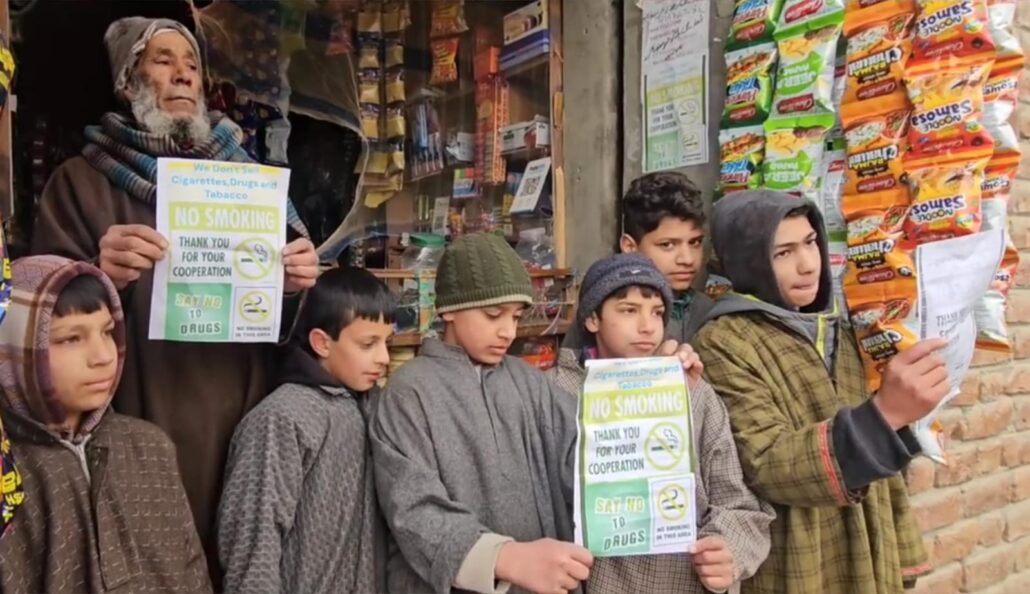
Suhail Dar
In a rare grassroots initiative, this small village in south Kashmir’s Shangus area has taken a firm stand against tobacco, setting an example for the region.
Sheikhgund, located 14.5 kilometers from the district headquarters of Anantnag and surrounded by lush apple orchards, has become a beacon of change by banning the sale and use of tobacco products.
The streets of the village are now adorned with bright placards and banners that boldly declare: “No to Smoking,” “No to Tobacco,” and “Sheikhgund: A Tobacco-Free Zone.” These boards are a testament to the community’s determination to reclaim their health and protect future generations.
The campaign began earlier this year when residents gathered at the local mosque to pledge a collective fight against tobacco. The meeting culminated in a community-wide agreement: all shops would cease selling tobacco products, and smokers would receive full support to quit.
The local mosque played a pivotal role in enforcing this decision, inspired by the efforts of Jafar Salam, a 30-year-old activist from the village. “Two months ago, we held a meeting in the village mosque, where we discussed the growing harm of tobacco on our community,” said Abdul Rashid Mir, a respected elder. “This is where we decided that tobacco must be banned. There are not more than seven shops here, but nobody is selling tobacco-related products anymore. It’s a collective effort, and the commitment of our shopkeepers is remarkable.”
Jafar Salam emphasized the importance of a unified stand. “When I first brought up the idea, I wasn’t sure if everyone would support it,” he said. “But the community proved me wrong. They understood that tobacco not only destroys health but also weakens the moral fabric of society. The mosque has been instrumental in guiding this effort, reminding us of our responsibilities.”
“It was time for us to act decisively,” said 65-year-old Ali Mohammad, a retired teacher and community elder. Reflecting on his own transformation, Ali admitted that he once sold tobacco products in his small store.
“I used to think it was just business, but I’ve come to realize that earning from something harmful goes against both ethical and spiritual values. Now, I proudly tell my customers that they won’t find such products here anymore.”
The campaign gained significant traction under the leadership of Jafar Salam. “Smoking doesn’t just harm individuals—it destabilizes families and leads to addiction,” Jafar added.
“We’ve already seen the devastating effects of substance abuse in other areas of Kashmir. Sheikhgund won’t let that happen here.”
Kashmir has seen a worrying rise in tobacco consumption in recent years. According to data from the National Family Health Survey, nearly 30% of adults in Jammu and Kashmir use some form of tobacco, higher than the national average.
A study conducted by the Government Medical College in Srinagar revealed that tobacco-related diseases are responsible for a significant share of preventable deaths in the region, with lung cancer and cardiovascular conditions being the most common.
Experts estimate that smoking among Kashmir’s youth is alarmingly high, with over 15% of young adults aged 18-24 actively using cigarettes. Campaigns like the one in Sheikhgund aim to combat these trends by addressing the problem at its root.
Notably, the women of Sheikhgund have played a crucial role in the initiative. “This isn’t just a men’s issue—it’s about the entire community,” said 24-year-old Nusrat Jan, a postgraduate student.
“We’ve seen how tobacco ruins families. It’s not just about health; it’s about protecting our future. If we don’t act now, the next generation will suffer the consequences.”
Nusrat, along with other women, has been organizing awareness programs and speaking at schools about the dangers of tobacco. “As women, we are often the ones who witness the fallout of addiction in our homes. We’re determined to stop it before it takes root here,” she added.
The village, home to around 250 families, has embraced the anti-tobacco movement with enthusiasm. Volunteers conduct regular inspections to ensure compliance, while the mosque continues to host sessions offering guidance and encouragement to quit smoking.
Even former smokers have become ambassadors for the cause. Bashir Ahmad, a 60-year-old farmer, shared his story with pride: “I smoked for over 30 years, and it became a part of my life. But this campaign gave me the push I needed to quit. Now, I feel like I’ve regained my health and my dignity.”
Sheikhgund’s leaders hope their example will inspire neighboring villages to follow suit. “This is just the beginning,” said Jafar Salam.
“We want Sheikhgund to be a model village, and we hope others will join us in creating a healthier, tobacco-free future. If one village can do it, why not the entire region?”
As Sheikhgund takes this brave stand, its residents are optimistic about creating a healthier future—not just for themselves, but for the entire region.




